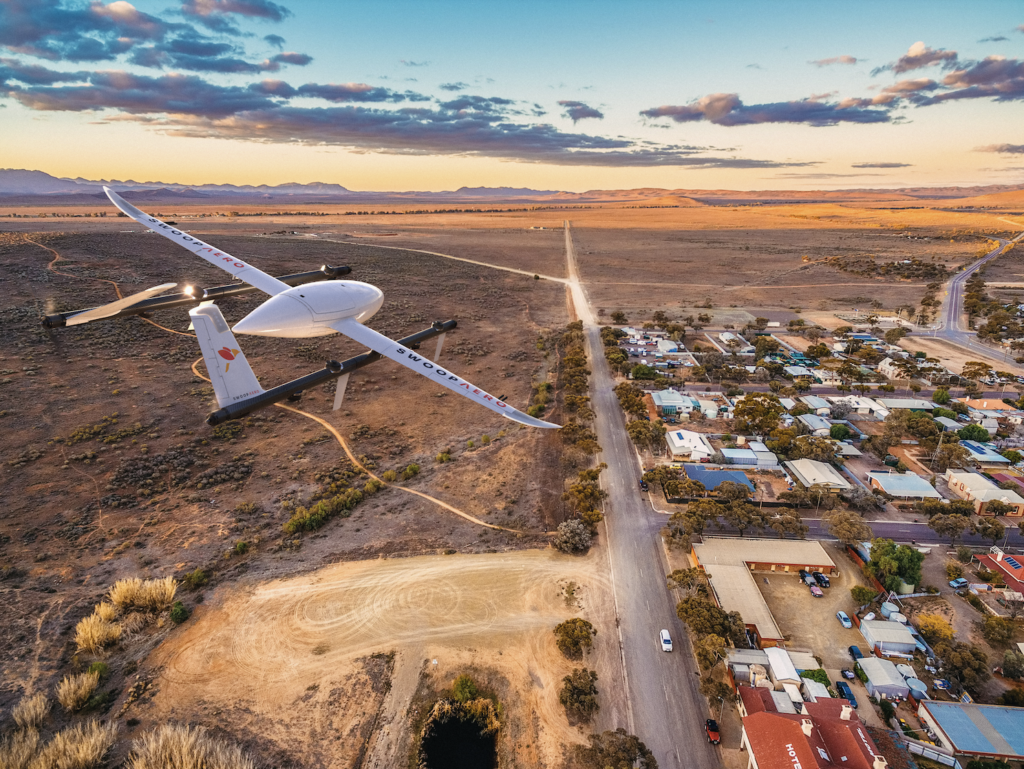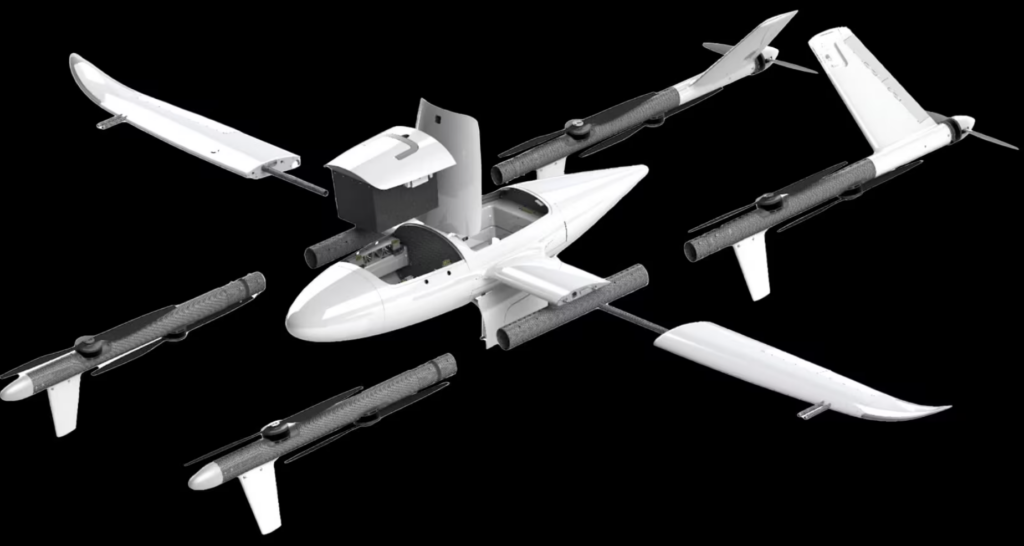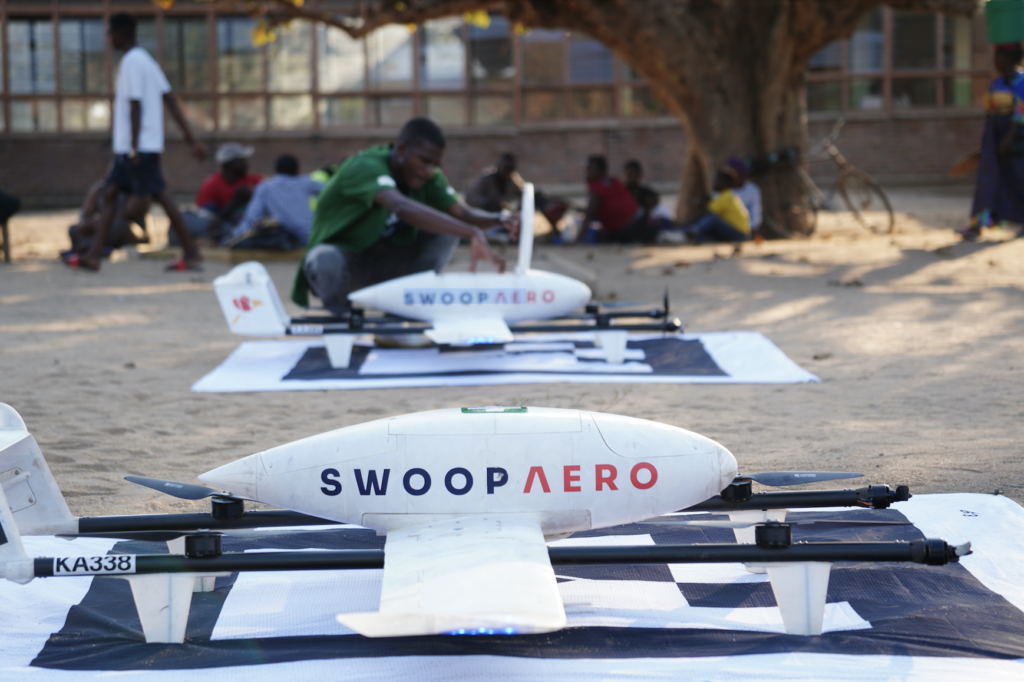Swoop Aero: Beyond Consumer Delivery


Swoop Aero is expanding its presence in the U.S. with support from Quickstep USA. The Australian drone logistics company aims to provide its Kite drone to the Department of Defense and other federal agencies through a recent Memorandum of Understanding. (Photo: Swoop Aero)
Swoop Aero, an integrated drone logistics company based in Australia, is expanding its presence in the U.S. with the help of Quickstep USA’s networks and expertise. The company, which already operates full-stack software and hardware logistics operations across four continents, recently entered into a Memorandum of Understanding (MoU) with Quickstep USA. The agreement aims to provide Swoop’s Kite drone to the Department of Defense and other federal agencies.
During an interview with Avionics International, Swoop Aero CEO Eric Peck discussed the role of drones in security and defense, as well as the process of scaling drone usage in the U.S. for various purposes, including consumer delivery.
Medical deliveries and logistics form the foundation of Swoop Aero’s global operations. The company has successfully transported approximately 1.4 million medical items via drone. Peck explained their approach, stating, “We design, prototype, and manufacture the physical drone aircraft, and then code all the enabling software that allows us to deploy a drone logistics service at scale.”
Swoop Aero currently operates integrated drone service networks in six countries, including Malawi, the Democratic Republic of the Congo, Mozambique, Namibia, Australia, and New Zealand. They also have partners operating networks in the UK, Europe, and Singapore.
The fifth generation of Swoop Aero’s Kite aircraft is currently undergoing FAA certification. This certification will validate the drone’s safety for various operations such as search and rescue, data capture, and surveillance, in addition to package delivery.

“As an equity investor and manufacturing partner to Swoop Aero, we are delighted to bring their technology leadership to the world’s largest aerospace market. We believe the flexibility of their drone family and proprietary infrastructure has fantastic potential across the US defense and security market.” – Steve Osborne, Quickstep USA’s Vice President
In 2021, Swoop Aero and Iris Automation announced a new partnership to use both companies’ technology to create a beyond visual line of sight (BVLOS) drone navigation system. Swoop Aero planned to incorporate Iris Automation’s detect-and-avoid technology, Casia, onto their aircraft.
The New Zealand Civil Aviation Authority granted approval to Swoop Aero in late 2022 for BVLOS operations in New Zealand. Swoop Aero announced in February of this year that it will partner with Te Whatu Ora Health New Zealand to launch an integrated drone logistics network.
Peck emphasized that a key aspect of Swoop Aero’s business is their vertically integrated technology stack. He stated, “We own and develop every bit of our technology stack; we manufacture the vehicles and then deploy services with them.” To ensure supply chain security in their manufacturing process, the company has sought out high-quality partners and suppliers across multiple countries, including Australia, Europe, the United States, England, and Australia.
Quickstep Holdings, the parent company of Quickstep USA, serves as Swoop Aero’s primary composite manufacturing partner in Australia, with an assembly facility located in Melbourne. The relationship with Quickstep has strengthened as Swoop Aero has scaled up the manufacturing of their Kite drone.
As the organization has matured, Swoop Aero has started exploring other sectors beyond medical transport. They deploy a fleet of aircraft to provide a range of services, including search and rescue, disaster response, commercial mapping, monitoring, data collection, and long-range inspections of power lines and agricultural properties.

“Based in the cloud, and underpinned by the Swoop Aero Digital Twin, the fully integrated suite represents every core and supporting software application required to operate an unlimited fleet of drones from anywhere in the world.”
While Swoop Aero has established a presence in Europe, England, Africa, and Southeast Asia, their current focus is on the potential of the U.S. market and the Americas. The MoU with Quickstep is part of their strategy to further engage with the U.S. market, including the three primary countries within the trilateral security partnership known as AUKUS (Australia, the United Kingdom, and the U.S.).
Peck highlighted the long-standing use of autonomous or uncrewed systems in government, particularly in defense. Drones have been increasingly utilized for various operations beyond combat, such as humanitarian aid and disaster response.
Swoop Aero aims to offer a dual-use capability to government and defense sectors, leveraging the technology developed for commercial applications. By doing so, they can substantially reduce costs for organizations such as the Department of Defense in the U.S., the Australian Defence Force, and the Ministry of Defence in the UK. This approach allows them to provide access to the latest technology, which can be continuously updated wirelessly without the need for new acquisition programs.
In their pursuit of commercial drone logistics, Swoop Aero prioritizes the development of a product that attracts paying customers. This involves offering valuable services, ensuring efficient and safe operations, and using customer feedback to improve the technology and reintroduce it to the market. Peck likened their approach to an agile software development program, where they test and refine the product based on customer input while maintaining a strong aviation safety management structure.
There have been three significant challenges in Swoop Aero’s journey: the high economic cost of the technology, its maturity level, and regulatory obstacles. However, the affordability, reliability, and maturity of the technology have improved, meeting aviation safety standards. Regulators have kept pace with technological advancements, and there are upcoming bills and international efforts that aim to enable widespread commercial deployment of drone technology.
“I think early on in the development cycle, people were saying the regulators aren’t ready to actually deploy this service at scale,” he commented. “Our view at Swoop Aero, and my view as the CEO, is that the regulators have basically kept in line with the technology.”
Peck expressed confidence in the regulators’ alignment with the technology, noting that two bills with bipartisan support are expected to be passed through Congress in 2023 or early 2024, facilitating commercial deployment at scale.
The post Swoop Aero: Beyond Consumer Delivery appeared first on Avionics International.
—————
Boost Internet Speed–
Free Business Hosting–
Free Email Account–
Dropcatch–
Free Secure Email–
Secure Email–
Cheap VOIP Calls–
Free Hosting–
Boost Inflight Wifi–
Premium Domains–
Free Domains





